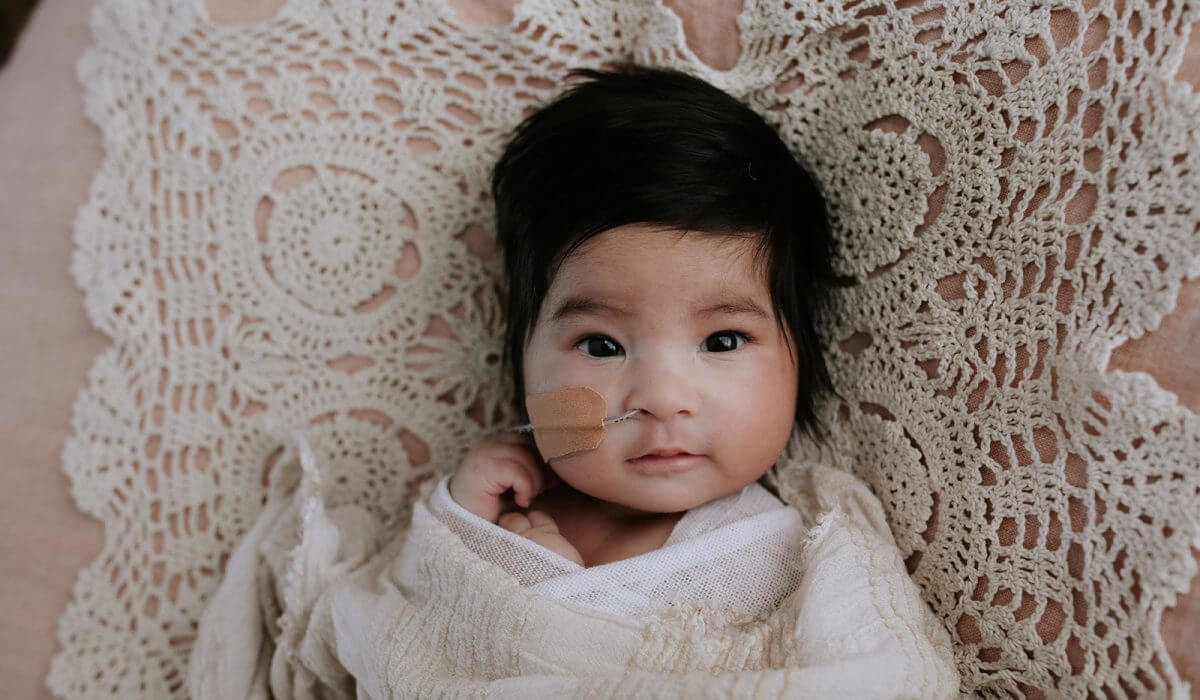Newly Diagnosed?
The early days with your baby have most likely been exhausting, with a rollercoaster of emotions. At birth, no one is able to offer a definite diagnosis and Prader-Willi Syndrome (PWS) is only confirmed through genetic testing.
Your child’s Pediatrician may have suggested many possible scenarios about why your baby is small, lethargic, floppy, quiet and not feeding well. They may have sent off pathology samples for testing to provide answers. In the meantime, it is their role to continue to investigate. However, genetic testing is taking a lot less time these days and so a diagnosis, although heartbreaking, can end the constant worrying of the unknown. Once it is confirmed that your baby has PWS, medical care can be focused on just what your baby needs.

It is perfectly normal, to feel conflicting emotions. At this time in your journey, you will probably have shed many tears and felt concerned and worried about your baby’s wellbeing both before and after diagnosis. Concern for the future and the fear of the unknown is perfectly normal.
Many parents, before you, have described feelings associated with grief. Why us? Why my baby? I just want the future I have already imagined. I don’t feel I can or want to deal with this. These are the thoughts we don’t always admit to others.

It is perfectly normal to grieve for the life you expected. Although this path may not be what you planned, a different path can be rewarding in its own way. This new addition to your family is full of personality and potential. It may be difficult to imagine now, but they will bring you overwhelming joy and love.
Social workers are available at most hospitals, and you may find it useful to talk to someone. If you notice that you are still not coping after leaving the hospital, talk to your doctor or the Maternal health nurse who should be in contact with you. Post-natal depression is not uncommon after an eventful birth for both mothers and fathers. Men will often try to remain strong and won’t allow themselves to express their emotions. PANDA cites 1 in 5 new Mums, and 1 in 10 new Dad’s will suffer from some degree of PND.
PANDA National Helpline
Call 1300 726 306 (Mon to Fri, 9am -7.30 pm),
https://www.panda.org.au/
Beyond Blue 24/7 Support hotline,
Call 1300 224 636 or online chat 3pm to 12 am 7 days a week
https://healthyfamilies.beyondblue.org.au
Lifeline
24/7 hotline, Call 13 11 14
https://www.lifeline.org.au/
Health and Wellbeing
Kangaroo Care
Natural skin to skin contact is essential. Cuddle your baby when you can. Play, talk, sing to your baby. Let your baby sleep in your lap or directly on your chest skin to skin. Direct skin to skin contact is known as Kangaroo care. It has numerous benefits for both you and your baby. It allows you to bond with your baby, keeps them warm, their stress hormones levels are decreased, they breathe easier and are more stimulated to feed. Even if your baby is connected to monitors and apparatus at the hospital, do not be afraid to ask for skin to skin time whenever you have the chance.
Hypotonia
Hypotonia is at its most evident at birth and can make it difficult for your baby to feed, cry or move. They will also be unusually sleepy. Despite the presence of these limitations, your newborn is developing and needs to be nurtured and stimulated, just like any other infant – maybe more.
Feeding
Newborns with Prader-Willi Syndrome do not feel hungry, and due to low muscle tone, it is arduous work for a baby with PWS to latch onto the breast and suck. The nasal-gastric tube is something most babies with PWS will use for some time. It is a small tube inserted into the nose, down the throat and into the baby’s stomach.
A combination of feeding methods (nasal-gastric tube and breast/bottle) is most commonly used during infancy.
There have been very few cases in the Prader-Willi Syndrome community where breastfeeding has been achieved. However, if this is your goal, we recommend you seek the advice and support from a lactation consultant who will work closely with you to try to achieve this. Please remember that whichever feeding method you choose (breast or bottle), expressing and using breastmilk is undoubtedly encouraged if possible. Still, it is a personal decision, and there are many fantastic formulas available.
There are numerous types of bottles and teats available, and it is trial and error. The Habermann bottle is popular as the teat can be manipulated to help fluid trickle into your baby’s mouth and assist with feeding. Hospital staff or a specialist speech therapist can assist with advice about trialling different teats and bottles.
It is important to keep a schedule for feeding, as your baby may not wake or cry to be fed. In these early stages of life, adequate nutrition, including fat is imperative for your baby to thrive and for brain development. Your baby’s feeds must never be restricted, and at this stage, some feeds may be supplemented with additional kilojoules.
Always seek the advice of a dietician during this time. The hospital will be able to assist with referrals and connections.
PWSA Victoria training
Often families find it challenging to share relevant and purposeful information with their friends and extended family. The Prader-Willi Syndrome Association of Victoria provides information sessions which are personally tailored. While providing information to your friends and a family in a formal setting can feel extreme, these sessions are informative, educational and are delivered with a positive and compassionate message. Your support network will understand how best to support your family and child and how to keep them safe. We can provide this training in your home or a venue that is convenient for you.
During the consultation process, we work closely with you to understand your requirements and develop a training session tailored to your needs. For a consultation, please contact the Prader-Willi Syndrome Association of Victoria on 0451 797 284 or complete the below enquiry form.
For a consultation, please contact the Prader-Willi Syndrome Association of Victoria on 0451 797 284 or complete the inquiry form on our PWSA Victoria in-service training page.